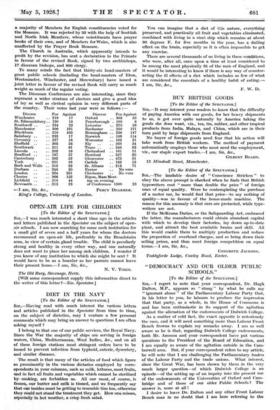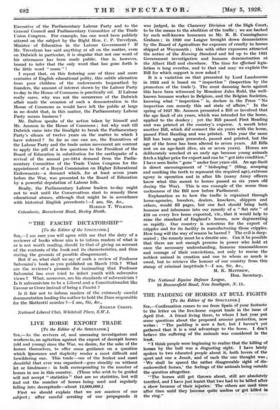"DEMOCRACY - AND OUR OLDER PUBLIC SCHOOLS."
[To the Editor of the SPECTATOR.]
Sin,—I regret to note that your correspondent, Dr. Hugh Dalton, M.P., appears so " stung " by what he calls my " ignorant abuse " of the Parliamentary Labour Party that, in his letter to you, he labours to produce the impression that that party, as a whole, in the House of Commons is and has been enthusiastic in its support of the agitation against the alienation of the endowments of Dulwich College.
As a matter of cold fact, the exact opposite is notoriously the case, and it will need something more than Labour Front Bench frowns to explain my remarks away. I am as well aware as he is that, regarding Dulwich College endowments, both Mr. Ammon and your correspondent have put various questions to the President of the Board of Education, and I am equally as aware of the agitation outside in the Cam- berwell area. But, if your correspondent refers to my article, he will note that I am challenging the Parliamentary leaders of the Labour Party and the trade unions. What interest, since the Great War, has been shown by them in the very much larger question—of which Dulwich College is an episode—of the setting up of an. inquiry into the present use of the endowments of the Universities of Oxford and Cam- bridge and of those of our older Public Schools ? The answer is, none at all !
I desire to leave. Dr. Dalton and any other Front Labour Bench man in no doubt that I am here referring to the Executive of the. Parliamentary Labour Party and to the General Council and Parliamentary Committee of the Trade
Union Congress. For example, has one word been publicly uttered on the subject by the Right Hon. C. P. Trevelyan, Minister • of Education in the Labour Government ? If
Mr. Trevelyan has said anything at all on the matter, even on Dulwich in- particular, it is singular that not one word of his utterances has been made public. One is, however, bound to infer that the only word that has gone forth is the little word " mum " !
I repeat that, on this festering sore of three and more centuries of English educational polity, this subtle alienation from poor children of the endowments bequeathed by founders, the amount of interest shown by the Labour Party to-day in the House of Commons is practically nil. If Labour really cares, why was not the occurrence of the Dulwich affair made the occasion , of such a demonstration in the House of Commons as would have left the public at large in no doubt that, in this matter, the Parliamentary Labour Party means business ?
Mr. Dalton speaks of the action taken by himself and Mr. Ammon in the House of Commons ; but why wait till Dulwich came into the limelight to break the Parliamentary Party's silence of twelve years on the matter to which I have referred ? So far as one can see, the Executives of the Labour Party and the trade union movement are content to apply the pill of a few questions to the President of the Board of Education in substitution for the earthquake of a revival of the annual pre-1914 demand from the Parlia- mentary Committee of the Trade Union Congress for the appointment of a Royal Commission on Higher Educational Endowments—a demand which, for at least seven years before the War, was presented to the Board of Education by a powerful deputation of Labour folk.
Really, the Parliamentary Labour leaders to-day ought not to wait until the Conservatives start to remedy these educational abuses, although that might be, in accordance with historical English precedents !--I am, Sir, &c., HAROLD T. WILKINS.
Colomberie, Barnehurst Road, Bexley Heath,









































 Previous page
Previous page